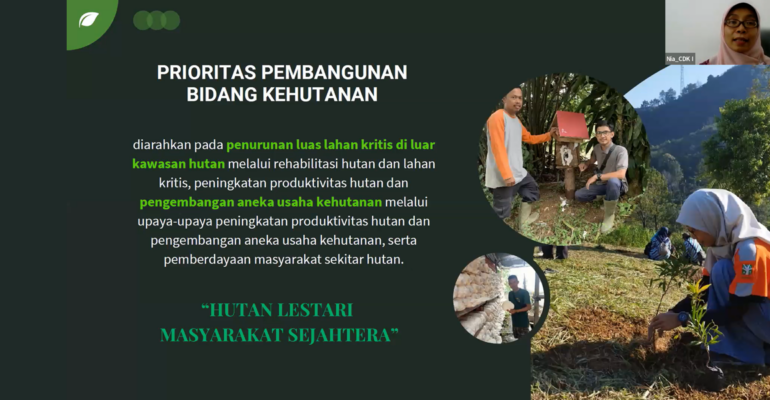DSVK Guest Lecture: Sustainable Forests, Prosperous Communities

The Department of Silviculture, Faculty of Forestry and Environment (Fahutan) held a DSVK Guest Lecture. This activity is a form of practitioner activity teaching the 2023 Matching Fund (Kedaireka) program between Fahutan IPB University and the West Java Provincial Forestry Service.
The Kedaireka Matching Fund program was launched to accelerate the rehabilitation of critical land through a participatory approach in Bogor Regency. This program is chaired by Dr Adisti PP Hartoyo, IPB University lecturer from the Department of Silviculture.
No less than 109 participants attended the Guest Lecture event with the theme ‘Sustainable Forests, Prosperous Communities’. A number of resource persons who attended included Nia Rachmawati, SHut, MSi (Forest Products Analyst, Region I Forest Service Branch), Basir Baesuni, SPd (Nature Conservation Cadre), and Obay Subarnas, SSI (Chairman of Ada Jamur, CV Azzam Agro Globalindo).
“The material presented by the resource person is a new lesson for students to understand the prospects for community welfare through forest sustainability. “Participants learn about programs to support forest sustainability and community welfare implemented by the Region I Forestry Service Branch,” said Dr Adisti.
Some of the programs implemented are the forest management program and the millennial farmer program. Participants also learned about the role of nature conservation cadres in forest and land rehabilitation activities. Nature conservation cadres carry out several activities including coordination with related parties, providing conservation materials to various schools, and outreach to the community. Cadres also play a role in protecting, preserving and utilizing natural resources (SDA) as well as community empowerment.
The millennial farmer program is considered to support mushroom cultivation businesses. The existence of a mushroom cultivation business has a positive impact on society, including absorbing the workforce, becoming a business role model in rural areas, opening up business space for partners, and becoming an example of courageous entrepreneurship.
“Our hope as conservation cadres is that the younger generation and millennial farmers will participate in carrying out conservation activities,” said Basir Baesuni, one of the presenters.
One of the event participants, Anisa, admitted that she had gained the knowledge to understand the composition of good mushroom baglog to maximize mushroom growth. (*/Rz) (IAAS/YMK)



